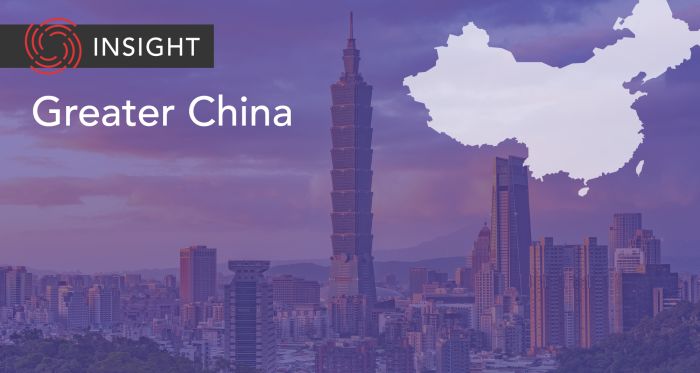The Takeaway
The dust has now settled in Taiwan: both opposition parties, Kuomintang (KMT) and the Taiwan People's Party (TPP), as well as the ruling Democratic Progressive Party (DPP), have picked their presidential candidates for the 2024 election. As the three-way race officially kicks off, attention turns to the contenders’ next moves and their proposed solutions to Taiwan’s most significant challenges.
In Brief
On May 8, Ko Wen-je, ex-mayor of Taipei and current chairman of the TPP, formally applied to run for the 2024 presidential election on behalf of his party. Seeking to build his campaign around the idea of “peace, harmony, and reconciliation” between Taiwanese citizens and their political parties, Ko has recently discussed issues such as restoring "residential justice" for Taiwan’s youth and keeping housing prices in check.
Meanwhile, Taiwan’s main opposition party, KMT, announced on May 17 that Hou Yu-ih, a two-term mayor of New Taipei City, would represent the party in the upcoming election. Positioning himself as a moderate opposing both Taiwanese independence and Beijing’s ‘One Country, Two Systems’ model, Hou is seeking to unite Taiwan and defeat the ruling DPP. Hou beat Terry Gou, a longtime KMT member and founder of Taiwan's semiconductor giant Foxconn, to gain the party’s nomination.
Implications
Ko's presidential bid — which saw minimal intra-party resistance — marks the TPP’s latest bid to shake up Taiwan’s ‘blue-green’ (KMT-DPP) rivalry and affirms the party’s position as the island’s centrist third force. Capitalizing on Ko’s political legacy (he oversaw Taipei when it emerged as one of the most livable cities in the world), the TPP hopes to replicate Ko’s brand of pragmatism in Taiwan’s highest office. While this young political party, founded in 2019, has tried to differentiate itself from the two established camps, its lack of a clear security policy and other governance issues have subjected both Ko and the TPP to increased public scrutiny. Nonetheless, offering a middle way to the public may track well among those who are tired of the inter-party and factional struggles symptomatic of the current DPP-KMT divide.
Meanwhile, the KMT’s much-delayed decision to pick Hou over Gou to contest the January 2024 election settles the party’s months-long leadership question. After intra-party wrestling to choose from Gou, Hou, and incumbent party chair Eric Chu, Hou ultimately got the nod for his “visionary leadership and co-ordination” while serving as Taiwan’s police chief and, more importantly, for his cross-camp connections and broad popularity at the grassroots level.
Hou’s moderate, middle-ground position on cross-strait issues could also make him less of a target for the 'pro-independence' DPP during the coming campaign. Compared to billionaire-turned-politician Kou, who has had fallouts with the party and is widely seen as a pro-Beijing figure, Hou’s candidacy reflects the KMT’s balancing act in its Mainland China policy, as he holds a position that diverges from the party’s more traditional, ‘Beijing-friendly’ image to appeal to a broader pool of Taiwanese voters. The TPP’s Ko, meanwhile, might land on a similar middle ground in his geopolitical strategy, as he is seen as supporting Taiwan’s sovereignty while promoting engagement with both Beijing and Washington.
While both the KMT and TPP have criticized the DPP for its handling of cross-strait relations and accuse the party of disrupting channels of engagement with Beijing, the latest opinion polls indicate that, at least for now, a victory for Lai Ching-te, the DPP candidate and Taiwan’s current vice president, is the most likely outcome. With a public approval rating of 35.4 per cent, Lai currently leads Hou (26%) and Ko (22%) in popularity, according to a May 2023 presidential primary poll conducted by Taiwan-based Formosa Digital Times. An April 2023 poll by the Taiwanese Public Opinion Foundation portrays a narrower winning margin: 33 per cent of those surveyed preferred Lai (DPP), while 29.7 per cent of respondents preferred Hou (KMT).
What’s Next
1. The domestic challenges that can't be ignored
While cross-strait issues have always loomed large in Taiwanese presidential races, politicians learned during local elections in November 2022 that internal issues, such as housing unaffordability and broader economic stagnation, could be more important to young voters. Presidential hopefuls will need to draw up a national security vision alongside a sound blueprint for Taiwan’s economic and social welfare to satisfy broader voter concerns.
2. Will there be Ko-Gou co-operation?
Although the KMT’s Terry Gou said after the nomination announcement that he would support his party’s presidential candidate Hou to “take down the incompetent (DPP) government,” recent interactions between Gou and the TPP’s Ko have led some to speculate about possible collaboration between the two, especially as Ko is still looking for a running mate.
3. Beijing, Washington look on
While the KMT’s Hou will surely be pressed to elaborate on his cross-strait policy, Beijing, which traditionally favours China-friendly KMT candidates, will be closely monitoring the campaign pledges of this unconventional candidate, who walks a line between Taiwan's independence and Beijing’s ‘One Country, Two Systems’ model. Washington, meanwhile, still has much to learn about Ko’s emergent third party, with which it has no established working relationship.
• Produced by CAST’s Greater China team: Maya Liu (Program Manager) and Dustin Lo (Analyst).




